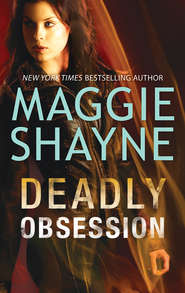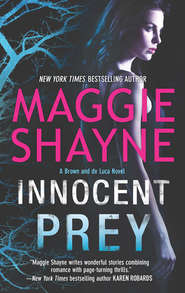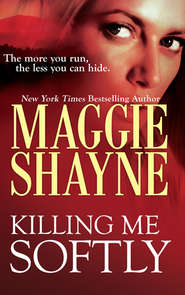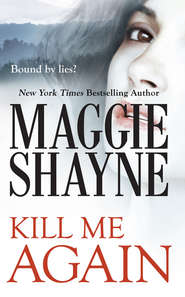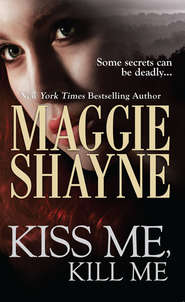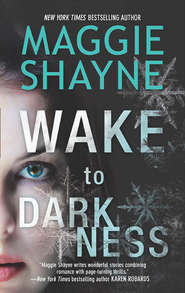По всем вопросам обращайтесь на: info@litportal.ru
(©) 2003-2025.
✖
Twilight Prophecy
Автор
Год написания книги
2019
Настройки чтения
Размер шрифта
Высота строк
Поля
“And yet … not. You know?”
“No. No, I don’t.”
“Ask her what she felt when he was touching her,” the scarred man barked.
She didn’t like his voice, and she didn’t like him speaking as if she wasn’t even in the room. And she wanted to go home. To her cozy one-story house with the flower boxes in the windows and the neat sidewalk that was all bordered in flawless flower beds, just like the house itself. Her house was sunny and yellow and orderly and neat, and above everything else, it was safe.
Safe. Like the big maple tree at her grandpa’s house, when she used to go there as a child and play tag with her neighbors. The giant tree was always safe. She’d convinced herself that her home was the same way. Off-limits. No one could get to her there. No pain, no violence. Home was her haven.
“When the stranger put his hands on you, what did you feel?” asked the woman with the Stevie Nicks voice and Cruella de Vil hair—Lillian, Lucy remembered.
“I was terrified. I’d just been shot. At least … I thought I had. I was covered in blood, and it hurt, it really did. But I guess I must have … hallucinated it, or maybe I hurt myself when I fell down.”
“What did you feel physically?” the woman went on. “When the stranger put his hands on you?”
“Oh, that. Well … his hands felt … warm. And then hot. And it seemed like there was a light sort of … coming from them. And it filled every part of me. And for just a second, I thought I might be dying, and that he was an angel.”
“An angel,” the man said, nearly spitting the words.
“That’s an interesting thing to say.”
Lucy sighed. “I really want to go home now. I’m all right, aren’t I? I mean, I wasn’t shot after all, right?”
“Well, there are certainly no bullet holes in you now,” the woman said, sounding cheerful. And then she got up and joined the man, then spoke in a very, very soft whisper, “The pentothal is wearing off. Is there anything else you want, before …?”
“Ask her about her blood type. We tested her, came back positive for the antigen. I want to know if she knew.”
Why, Lucy wondered, did they think she couldn’t hear them?
But Lillian was returning to her bedside now. Lucy heard the woman’s footsteps on the floor tiles. Smelled the soap she used, too.
“Lucy, do you know if there’s anything … unusual about your blood type?”
“Yes, there is. It’s … very rare. Only a few people have it. It makes me bleed easily. And it’s hard to find a donor to match me, which is why I donate regularly and have my own supply in storage. But that’s at Binghamton General—and I keep some at Lourdes, too. That’s another reason why I was so afraid when I saw all that blood all over me.” She paused, opening her eyes now. “If it wasn’t my blood, whose was it?”
“We don’t know. Can you tell me any more about your blood ty—”
“But how can you not know? If someone else was shot on that sidewalk, how could you not—”
“Lucy, I’d like you to take a breath and calm yourself.” The woman put a soothing hand on Lucy’s forehead. “A lot of people were shot at that studio last night. Inside and outside. It was chaos. And I wasn’t there. I’m sure someone knows the answers to your questions, but it’s not me.”
Lucy sighed. “I want to go home.” She sat up in the bed and looked around the white room while waves of dizziness washed over her brain. “Where are my things?”
“Lucy, about your blood type,” Lillian said. “Is there anything else you can tell me about the Belladonna Antigen?”
Lucy blinked and met the woman’s eyes. Her head was beginning to feel clearer. “How do you know? I never told you what it’s called.”
“We want to know what you know about it.”
“What kind of a medical question is that?” Lucy narrowed her eyes, suddenly suspicious of this woman, who she’d assumed was a doctor or a shrink—or maybe a grief counselor, sent in to help her process what had happened.
“You want to know if I’m aware that I’m going to die young? I am. There’s no treatment, and there’s no cure. People with this antigen usually die in their thirties. And I’m in mine now, but so far I feel fine. No symptoms.”
“And what would those symptoms be?”
“You tell me, you’re the doctor.” Lucy watched the woman’s face and knew, just knew. “Or if you’re not, then I’d like to know who you are.”
“I am a doctor. And I work for the government,” Lillian said. “And I think we’re all through with your questioning now. You can relax. I’ll be back in a moment.”
“I don’t want to relax,” Lucy said. “I haven’t done anything wrong. I’ve told you everything I know.” She was suddenly terrified, and while she thought she might benefit by demanding her rights or a lawyer, she decided to wait until those things were truly necessary. She didn’t like conflict or confrontation, but she liked the unknown even less. And she had no idea who these people were or where she was being held. And it was feeling more and more as if she was … being held. She’d assumed she was in a hospital, but she wasn’t so sure anymore.
The woman crossed the room to where the scar-faced man waited near the door, and then they stepped through it, leaving her all alone.
Lucy got up and went to the door—the windowless door—as well. And as she did, a feeling of fear rippled up her spine, because she had a pretty good idea of what she was going to find when she got there.
She closed her hand around the doorknob and twisted, her heart in her throat—and then it sank to her feet when the knob didn’t budge an inch.
Locked.
She was being held by people who had drugged her and questioned her. And might even have shot her.
But then her hands rose to her chest, and she pulled the fabric away from her skin and looked down her neckline. The necklace she’d found inside the crazy author’s book was still hanging there, Kwan Yin looking serene and gentle. But there was no sign of any wound in her chest. Not a mark.
And yet she remembered it all so vividly. She’d felt that bullet tear through her.
God, she wondered, how could that be?
But she knew how. It was that man. That angel.
He’d healed her.
She closed her eyes and whispered a prayer to him right then and there. “If you really are my guardian angel, please, come find me again. Save me again. I need to get out of this place. I want to go home.”
4
“Well? Where is she?” Rhiannon demanded.
James tipped his head to one side and met the eyes of the most powerful vampire he had ever known. Also the most beautiful. And the most dangerous. Rhiannon stood beneath a crystal chandelier in the foyer of the Long Island mansion that was her summer home, or one of them. She wore her usual choice of attire, a floor-length gown, with a slit up to her hip on one side and a neckline that plunged to her navel. Black satin that was almost as shiny as her endless raven hair, or the black panther, her beloved pet, that rubbed against her legs as she spoke.
“Good to see you, too, Rhiannon,” he said. “It’s been a while.” He glanced at the cat. “Hello, Pandora.”
Rhiannon made a dismissive sound like a set of air brakes releasing a brief spurt of excess pressure. “You walked away from us, J.W. Not the other way around. Don’t expect a warm welcome when you finally deign to honor us with your presence.”
“Rhiannon, he’s—” Brigit began.
“Where is the professor?” the arrogant one asked again, and this time her tone brooked no argument. No discussion.
“She got away,” Brigit said softly.






